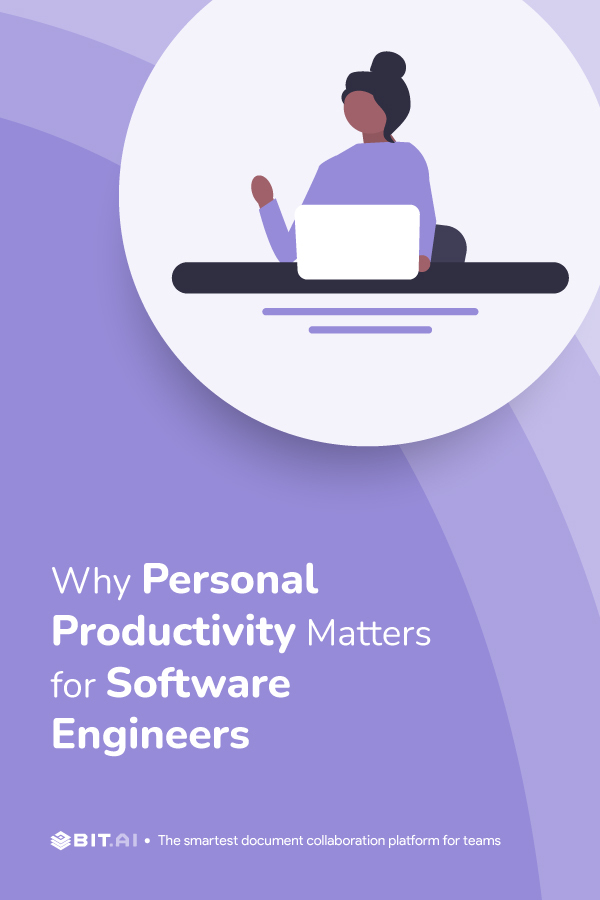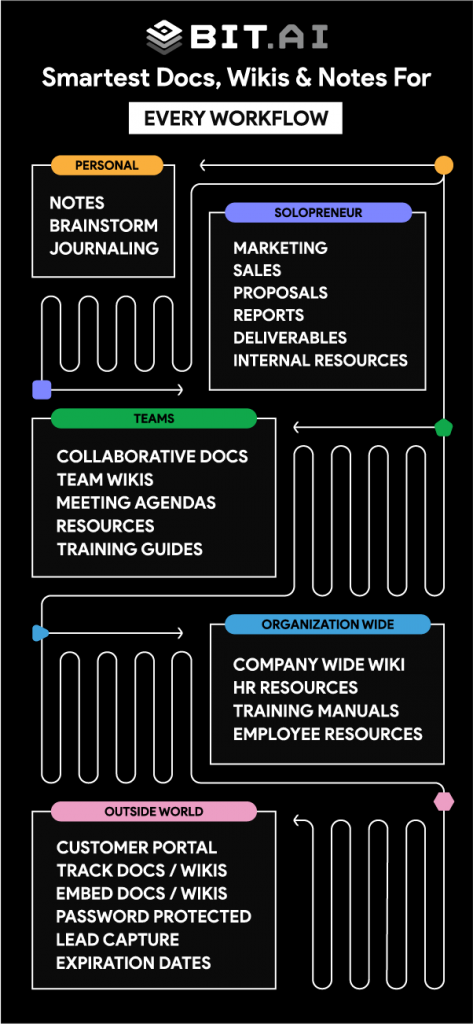Have you ever wondered how your fellow software engineers handle tricky coding tasks so smoothly? Well, they understand the importance of productivity for software engineers. On average, engineers only spend a small part of their workweek actually coding. What takes up the rest of their time? It often gets lost in messy workflows and distractions.
Consider an environment where software engineers not only code efficiently but also reclaim that lost productivity. The significance of this extends beyond mere operational efficiency. It’s critical to meet deadlines, create high-quality code, and, perhaps most importantly, maintain your balance between algorithms and syntax.
Want to improve your work process so you can spend more time coding and less time stuck in emails and meetings? Come with us on a journey where we’ll figure out how software engineers can be more productive. Let’s change things up and have a coding journey filled with focus and efficiency.
Table of Contents
What is Personal Productivity for Software Engineers?
Why Personal Productivity is Important for Software Engineers?
The Benefits of Being Productive as a Software Engineer
Time Management for Software Engineers
Tips & Techniques for Improving Focus and Concentration
How to Set Achievable Goals as a Software Engineer
What is Personal Productivity For Software Engineers?
Personal productivity for software engineers means efficiently completing tasks in the field of software development, covering coding, debugging, and project management for optimal results in minimal time. It aims to deliver the best software and go beyond merely staying busy.
Personal productivity includes wise time management, effective communication, and ongoing skill improvement. If you want to stay ahead in this fast-paced tech scene, you require hard work, smart work, and personal productivity to help software engineers skillfully deal with coding complexities and deliver outstanding results.
Why Personal Productivity is Important for Software Engineers?
Software engineers juggle tasks like coding, handling client requests, and debugging. They play multiple roles – from coding experts to problem solvers- facing new daily challenges. Then, out of nowhere, an urgent bug fix demands attention. Extra tasks show up, like surprise guests – sudden client questions, bug reports, or technical glitches. Without a plan, chaos sets in. That’s where personal productivity becomes the savior.
It’s not just about doing more; it’s about doing things smarter. A study says engineers spend about 30% of their time each year fixing bugs. Now, imagine if personal productivity could cut this by just 10%. That’s a significant time chunk for innovation. Beyond managing tasks, personal productivity helps keep a healthy work-life balance, preventing burnout and paving the way for long-term success.
The Benefits of Being Productive as a Software Engineer
Being productive as a software engineer brings a lot of benefits that significantly impact both your work and personal satisfaction. First and foremost, enhanced productivity translates to meeting deadlines with ease. Completing tasks efficiently not only impresses clients and team members but also reduces stress and pressure.
Increased productivity also results in the creation of high-quality code. When you can focus and manage your time effectively, the result is cleaner, better, and error-free code. This, in turn, contributes to the overall success of the project.
Being a productive software engineer is an opportunity for professional growth. Your ability to consistently deliver results positions you as a valuable team member, opening doors to exciting opportunities and career advancements. It also allows you to take on more challenging projects, further honing your skills and expertise. On a personal level, productivity provides a sense of accomplishment and work-life balance.
By efficiently managing your tasks, you free up time for relaxation and personal work. This balance is crucial for long-term job satisfaction and a sustainable, fulfilling career in the diverse field of software engineering.
Time Management for Software Engineers
Ever thought about how software engineers go through their workdays? Between coding, system upgrades, documentation, and the occasional meeting, their hours vanish like keystrokes in lines of code. A survey done on 3000 employees found that, on average, these tech experts work 8.6 hours daily, spending 2 to 6 hours coding.
The survey also reveals that meetings aren’t a software engineer’s favorite – around 70% of software engineers spend less than an hour in meetings. Client conversations are rare, with 47% not engaging at all and 39% spending less than an hour. Daily management tasks are quick for 48%, taking less than an hour.
This data proves that time management for software engineers isn’t about adding more tasks; it’s about optimizing time for coding, upgrading, documenting, and even in occasional meetings. Efficiently manage your time by employing effective tools and techniques, ensuring you work smart, not just hard.
But how can you make the most of this time management? Stay tuned for our next section, where we’ll reveal the secrets of setting achievable goals as a software engineer. Your journey to peak productivity is just a scroll away!
How to Set Achievable Goals as a Software Engineer
Setting achievable goals as a software engineer is more than a routine task; it leads you forward toward enhanced productivity. Achievable goals allow you to witness tangible results and boost motivation. While deciding your goals, you must consider the following:
- Define “Achievable”: Understand your capacity and avoid setting overwhelming goals. Realistic goals are necessary for sustainable productivity.
- Analyze Your Current State: Reflect on your strengths and weaknesses. What skills do you possess, and where do you need improvement? This self-awareness shapes achievable objectives.
- Consider External Factors: Acknowledge external influences—project timelines, team dynamics, and industry trends. These factors shape the practicality of your goals.
Before setting your goals, you must decide what type of goals you want. The goals are of three types: process, performance, and outcome. As their names suggest, process goals outline your steps and actions to achieve a larger objective. Performance goals focus on improving specific skills or completing tasks at a higher level; outcome goals are the desired end result or achievement you aim for.
For example, a process goal might involve learning a new coding language, a performance goal could be reducing debugging time, and an outcome goal might be launching a bug-free software update on time.
Now, how do you know if your goal is truly achievable? Evaluate its alignment with your capabilities, resources, and timelines. An attainable goal should stretch your limits but remain within the reach of possibility. Consider your skill set, available time, and potential obstacles. Also, regularly assess your progress, adjusting goals as needed.
You can use SMART goals to ensure that the goals you’ve set are attainable. This helps in systematically outlining your objectives, ensuring each goal is specific, measurable, achievable, relevant, and time-bound. Let’s break down what SMART goals are:
- Specific: Clearly define your goal. Instead of “Learn Python,” go for “Complete an online Python course by the end of the month.”
- Measurable: Quantify your progress. It’s not just about coding; it’s about coding a specific number of hours per week.
- Achievable: Ensure the goal aligns with your abilities. Don’t set a goal requiring skills you haven’t acquired yet.
- Relevant: Connect your goal to your broader career objectives. If you’re aiming for a leadership role, prioritize goals that enhance your managerial skills.
- Time-bound: Set a deadline. This creates a sense of urgency and helps you stay on track.
Achieving productivity as a software engineer depends on setting the right goals. Now that we’ve laid the foundation for effective goal-setting, the next step is enhancing focus and concentration. Explore tips and techniques in the next chapter. Read on!
Tips & Techniques for Improving Focus and Concentration
Precision in every line of code matters a lot in software development. Staying focused and working with complete concentration is the only way to get the tasks done. The Pomodoro Technique helps with work and breaks, your workspace supports productivity, and mindful breathing acts as a mental reset. Trying out these tips balances your work habits, taking your productivity to the next level.
1. Pomodoro Technique
Feeling overwhelmed by a big task? The Pomodoro Technique can help. Split your work into 25-minute chunks, called Pomodoros, with a 5-minute break after each. After four Pomodoros, take a longer break. This method works with your brain’s natural rhythm, preventing burnout and keeping software engineers productive. Focusing on short breaks helps you achieve more without feeling too tired.
2. Optimize Your Environment for Focus
Your workspace matters when it comes to concentration. Design your workspace to minimize distractions and enhance focus. Keep it tidy and decluttered, and customize it with elements that motivate you. Consider adding plants for a touch of nature, as they’ve been shown to reduce stress and increase attention span. A well-organized and pleasant environment sets the stage for improved concentration, allowing software engineers to channel their energy into coding without interruptions.
3. Mindful Breathing
In the world of code and problem-solving, don’t forget the power of mindful breathing. Take short breaks to breathe deeply. This simple technique boosts oxygen to your brain, making your mind clearer and reducing stress. Inhale for four counts, hold for four, exhale for four, and repeat. It’s a quick reset for your mind, promoting a calmer and more focused state. Including mindful breathing in your routine enhances overall productivity for software developers.
As we learn the secrets to boost your focus and concentration, there’s more to explore in the next section. We’ll combine these insights into a strong conclusion. So, keep reading!
Conclusion
In this blog, we’ve got insights about the importance of personal productivity, effective time management, goal setting, and techniques to enhance focus. Personal productivity ensures that each of your efforts aligns with broader objectives.
Now, take charge of your productivity by implementing these strategies, setting achievable goals and time-tested management practices. Remember, small adjustments make significant impacts. Consider this blog not just as a read but as your guide to daily success in software engineering. Set your coding hours, focus on goals, and let productivity be your forever friend.
Happy coding!
Further Reads:
Developer Productivity: What is it & How To Measure it?
Best Sales Productivity Strategies That Drive Sales!
Performance Management: Improve Employee Engagement & Productivity!
9 Daily Planners You Can Use to Improve Your Productivity!
Workplace Productivity: Definition, Importance, Tools & More!

Related posts
Bit.ai | Watch to Learn More
What is Bit.ai?
Bit.ai is an innovative AI-driven knowledge and Document Managment suite designed to empower knowledge workers by streamlining the creation of, documents, wikis, and notes. With an intuitive interface and seamless integration, Bit.ai acts as a versatile assistant to help you collaborate, generate, organize, and visualize your ideas effortlessly. Whether you are drafting a report, managing a project, collaborating with your team or clients, or brainstorming new concepts, Bit.ai brings intelligence and creativity to every aspect of your work process.


